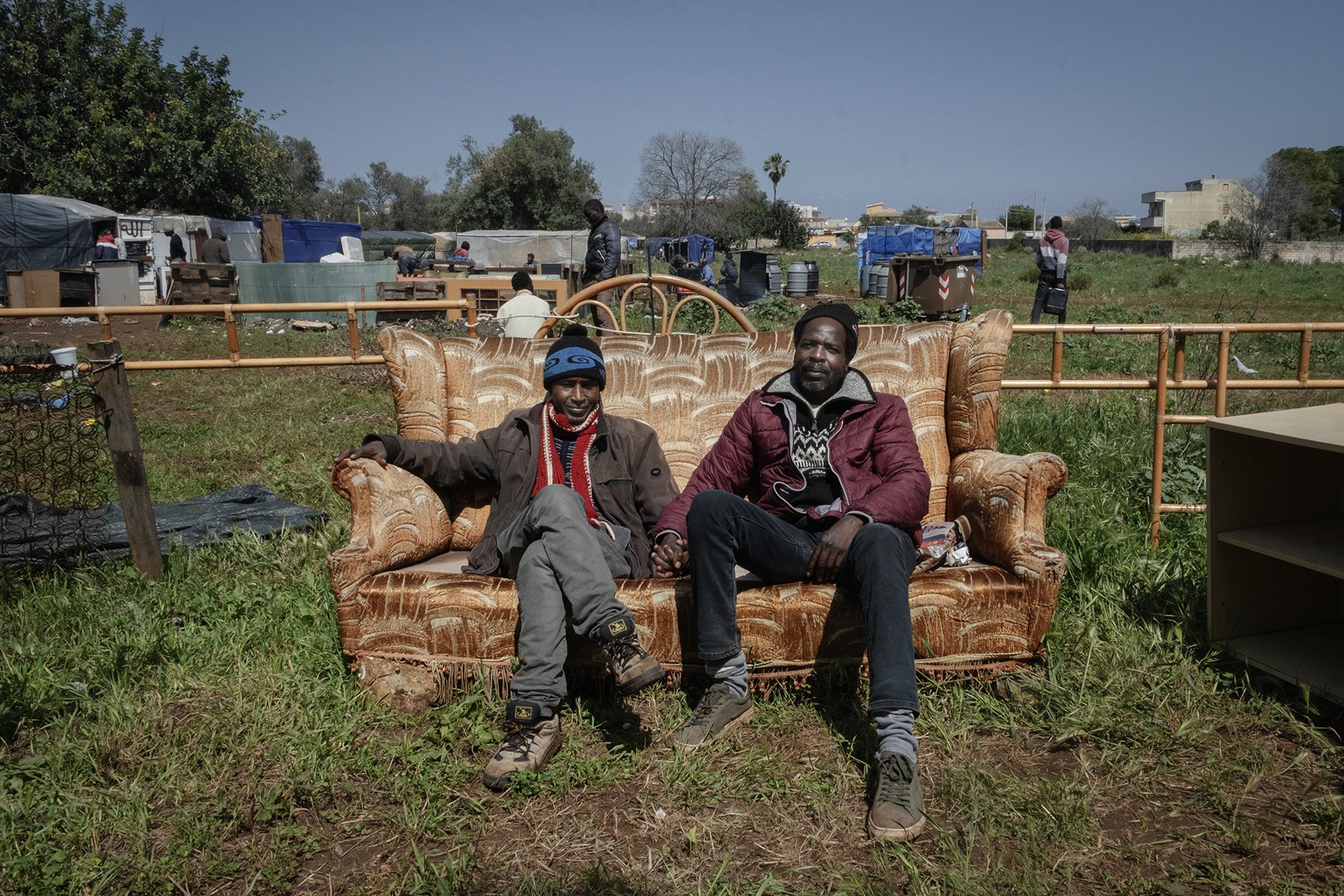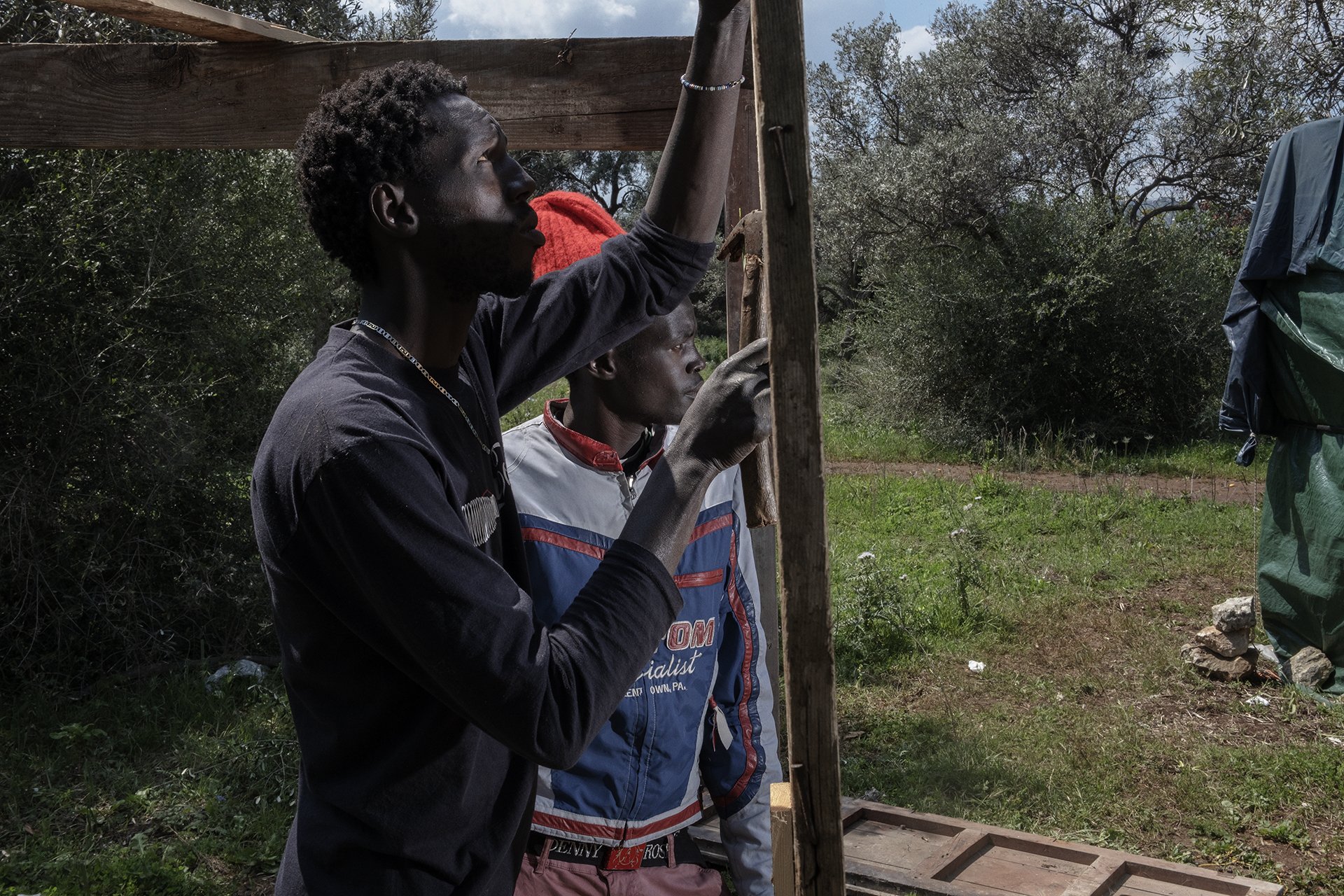The Italian government passed a law on 13 May paving the way for around 200,000 undocumented workers to apply for six-month legal residency permits. But just a few weeks later, the initial atmosphere of hope has quickly faded to a lukewarm welcome.
The amnesty was one measure in a 55 billion euro ($59.6 billion) stimulus package meant to support Italy’s economy as the country struggles with the effects of the coronavirus. Italy has had one of the most severe outbreaks in the world, with nearly 230,000 confirmed cases and more than 32,500 deaths as of 25 May.
The new regularisation law was initially greeted as a major step forward for migrant rights and as an example of good migration policy during the coronavirus pandemic. “From now on, the invisible will be a bit less invisible,” Italy’s minister of agriculture, Teresa Bellanova, said at a press conference announcing the law.
Supporters still say the new law is an important, if tentative, improvement. But critics argue that it amounts to little more than a temporary amnesty that puts economic interests ahead of human rights and will do little to address the rampant exploitation of migrant labour, especially in Italy’s agricultural industry.
Italy’s fields have long attracted migrant workers from eastern Europe, hundreds of thousands of whom flock to the country to work the harvest every year. They are joined in the fields by thousands of Africans and other non-Europeans who have crossed the Mediterranean to apply for asylum or to seek better lives in the EU. Nearly 500,000 people have made the journey since 2015. Many intended to move on to northern Europe but found themselves stuck with little choice but to try to find work in Italy’s informal economy.
“Legal papers don't necessarily protect you from exploitation.”
“[The law] is not exactly what we were hoping for because it is a very limited regularisation. But at this point, after decades of total invisibility, anything is better than nothing. It is a starting point,” Francesco Piobbichi, a social worker with the migrant support organisation Mediterranean Hope, told The New Humanitarian.
Not everyone agrees.
The Unione Sindacale di Base (USB), an Italian trade union that represents agricultural workers, called a national strike on 21 May to protest the law’s shortcomings. The union argues that the law is too limited in scope and will do little to protect exploited migrant agricultural workers. “Legal papers don't necessarily protect you from exploitation,” said Michele Mililli, a USB representative in Sicily. “This is a structural problem that should not have been addressed during a healthcare emergency, but much earlier.”
Exclusions, and only temporary
There are an estimated 560,000 undocumented migrants in Italy. But the new law only applies to people working in agriculture or as domestic helpers, leaving out people who work in other sectors of the economy that rely heavily on undocumented labour, such as construction and food services.
To regularise their status, undocumented migrants need the support of an employer or proof they were working in one of the eligible sectors prior to October 2019. “There is no guarantee that many [employers] will do it,” Enzo Rossi, a professor of migration economics at Tor Vergata University in Rome, told TNH. “And when the six months… expire, these people will be faced with the same dilemma as before the pandemic.”
The amnesty also excludes people who were stripped of humanitarian protection or legal status by a series of anti-migrant security decrees issued in late 2018 by former far-right interior minister Matteo Salvini that Human Rights Watch said “eviscerated Italy’s asylum procedure and reception system”.
The law focuses instead on people working in sectors of the economy deemed to be “essential” during the coronavirus crisis, such as undocumented agricultural workers who account for about 25 percent of Italy’s agricultural workforce, about double the amount of other economic sectors, according to Italy’s National Institute of Statistics.
Portugal’s decision in March to treat people with pending immigration applications as residents for the duration of the coronavirus crisis has been regarded as an effort to guarantee that undocumented migrants have access to healthcare and social services during the pandemic. But Italy’s regularisation is seen by USB and other trade unions and humanitarian groups as a more cynical attempt to plug its labour gap – an estimated 250,000 worker shortfall stemming from coronavirus-related travel restrictions and fears.
It’s also not the first time Italy has offered a path toward temporary regularisation for undocumented workers, mainly in agriculture. Over the past 35 years, there have been at least five amnesties, but they’ve never led to a comprehensive solution, according to Rossi.
“The systematic use of this tool has always postponed the bigger problem: a long-term legalisation solution,” Rossi said. “That’s why the numbers of undocumented workers have always been so high.”
Exploitation in Italy’s south
Every week, Monday through Saturday, Bachir Ahmed Ali wakes up at the crack of dawn in the tented slum near the village of Cassibile in eastern Sicily and quickly runs to a nearby road where his employer waits for him in a truck with a dozen other migrant workers.
In less than an hour, they are dropped at the edge of one of the many fruit and vegetable fields in the province of Syracuse where migrant workers pick produce, mostly strawberries and potatoes, from 6am to 2pm, earning 35 euros (about $38) per day.
This is the daily reality for more than 430,000 migrants working irregularly in Italy’s agricultural sector who are at risk of exploitation. Many of them live in makeshift encampments close to Italy’s agricultural fields, especially in the country’s south.These informal settlements consist of improvised tents or derelict buildings and often lack access to running water and electricity. The people who live in them are caught in what is known as the caporalato system, a 17 billion euro ($18.45 billion) a year industry of illegal employment and labour exploitation run by organised criminal groups and agricultural speculators.

In Cassibile, Ali shares his tent with eight other farmworkers from Senegal, Gambia, Sudan, and Burkina Faso. He doesn’t complain about the overcrowding. During the Muslim holy month of Ramadan, which ended on 24 May, he appreciated having the company. “They make me feel part of a family. I haven’t seen my real one since I was 14,” he told TNH.
Ali is now 30 years old. Originally from a village in Chad, bordering Sudan, he fled his home in 2006 when the country was on the brink of civil war and settled in Libya where he scraped by as a day labourer until the Libyan revolution erupted in 2011.
“The virus is not as scary as war or hunger. But I think our conditions should get more attention.”
“I decided to leave, like many other African migrants, because it was no longer safe for us there,” he said. “We all embarked on boats heading to Europe, so overwhelmed with fear that we couldn’t fully grasp what was happening. But I thought… I could at least get an education, maybe a job.”
But none of that happened. Ali didn’t receive any guidance on how to rebuild his life at the migrant reception centres in Sicily he stayed in after he arrived. Eventually, the only job he could find was in the agricultural fields outside of Rome. “I worked there for four years then I returned to Sicily. I just couldn't find anything else,” he explained.
Ali was granted political asylum and has legal residency. Nonetheless, he has been living in the makeshift camp of Cassibile, home to around 300 people, since 2015. Even during the coronavirus crisis, he has continued harvesting potatoes in Syracuse’s fields. “For me, the virus is not as scary as war or hunger. But I think our conditions should get more attention,” he said.

Staying afloat
Ali’s story highlights the limitations of Italy’s new regularisation law: if people with refugee status and legal residency have no choice but to work in the caporalato system, how will the new law help undocumented migrants escape exploitation?
Employers know that undocumented migrants are desperate for jobs and use that as leverage to continue explotative practices. “[Migrants] accept whatever gig and conditions that keep them afloat and allow them to send money home,” Mililli, the labour organiser from USB, said.
Most of the migrants working in Sicily’s fields have been in Italy for an average of 10-12 years, according to Mililli. Salvini’s security decrees made them even more vulnerable and, in certain cases, made it more difficult for them to access healthcare.
The 5,500 farms in the southeastern area of Sicily, home to southern Italy’s biggest wholesale produce market, employ about 30,000 workers. Sixty percent of them are foreigners making as little as 15 euros ($16.35) per day, according to USB. More than half of the migrant labourers continued to work throughout the coronavirus crisis – despite the health hazards and intensified police checks – because they had no access to financial relief from the government.
‘Health hazard’
While the coronavirus has intensified the situation, health risks are nothing new for Italy’s exploited migrant labourers. In the past six years, around 1,500 agricultural workers have died due to the living conditions in the informal camps, from suffocating in overcrowded trucks used to transport undocumented workers or from car accidents on the way to the fields, according to the Italian NGO Doctors with Africa.
When potato harvesting season ends at the beginning of summer, Ali heads for the tomato fields in Apulia, a region covering the heel of Italy’s boot. Seven informal settlements close to the town of Foggia host up to 6,500 people during the summer months.
“These places are a health hazard. They were before the virus came, and [they] became a reason of great concern during the pandemic,” Alessandro Verona, the leader of a medical team for the Italian NGO Intersos, told TNH. “If one person gets sick here, it can turn the whole ghetto into a mass slaughter.”
“Paradoxically, it took a pandemic to improve the situation here. We were granted more water access and toilets,” Verona continued. “But to tame what we consider no less than a humanitarian crisis, these ghettos need to disappear completely. And that will only happen when all undocumented workers are recognised and can rent real places to live [in] decently.”
In opting for a temporary amnesty, Verona added, Italy lost a great opportunity to promote human dignity.
On 18 May, five days after Italy’s regularisation law passed, a 33-year old Indian migrant working in a field outside of Rome was fired after asking his employer for a face mask for protection while at work. When the worker requested his daily wage, he was beaten up and thrown in a nearby canal.
sdi/er/ag





